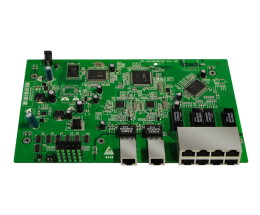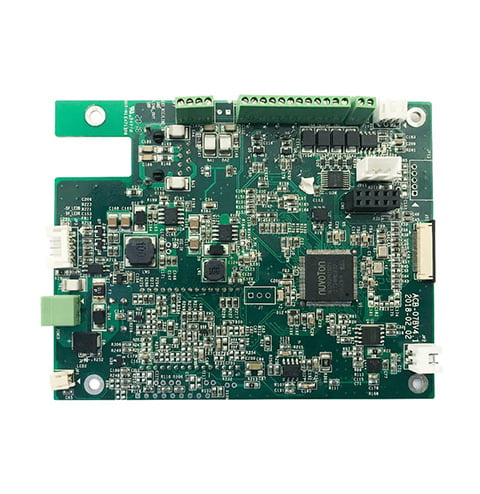Turnkey PCB Assembly Factory: Streamlining Your Production Process
If you are in need of a printed circuit board (PCB) assembly factory, you may have come across the term “turnkey” PCB assembly. Turnkey PCB assembly refers to a complete service that includes all aspects of the PCB assembly process, from PCB fabrication to component sourcing, assembly, testing, and shipping. A turnkey PCB assembly factory is a one-stop-shop that can handle all of your PCB assembly needs.

A turnkey PCB assembly factory can offer several advantages over other PCB assembly services. By handling all aspects of the PCB assembly process, a turnkey PCB assembly factory can reduce lead times, improve quality control, and lower costs. Additionally, turnkey PCB assembly factories can offer value-added services such as design for manufacturability (DFM) analysis, component sourcing, and testing. These services can help ensure that your PCB assembly project is completed on time, within budget, and to your specifications.
Overview of Turnkey PCB Assembly

If you’re looking for a comprehensive solution for printed circuit board (PCB) manufacturing, turnkey PCB assembly could be the answer. This service model is designed to take complete responsibility for all aspects of the PCB project, from parts procurement to component assembly.
Definition of Turnkey Service
A turnkey PCB assembly service provider takes care of everything from the initial design stage to final assembly. This means that you don’t have to worry about sourcing the components or managing the production process yourself. Instead, you can focus on other aspects of your business while the turnkey service provider takes care of the rest.
Benefits of Turnkey Solutions
There are several benefits to using a turnkey PCB assembly service:
- Simplified project management: With a turnkey service provider, you only need to communicate with one EMS provider. This simplifies project management, reduces the risk of miscommunication, and streamlines the entire process.
- Faster time to market: Turnkey PCB assembly can help you get your product to market faster. Since the service provider takes care of all aspects of the production process, you can focus on other aspects of your business while the PCBs are being manufactured.
- Cost savings: By outsourcing the production process to a turnkey service provider, you can save money on labor costs, equipment costs, and other expenses associated with PCB manufacturing.
- High-quality production: Turnkey PCB assembly service providers have the expertise and equipment needed to produce high-quality PCBs. This means that you can be confident in the quality of your products and reduce the risk of defects or other issues.
Overall, turnkey PCB assembly can be an excellent solution for businesses that want to streamline the production process, reduce costs, and get their products to market faster.
Key Components of a PCB Assembly Factory

When it comes to turnkey PCB assembly, a reliable and efficient factory is a must-have. Here are the key components of a PCB assembly factory that you should consider when choosing a turnkey service.
Manufacturing Equipment
The manufacturing equipment of a PCB assembly factory is crucial in ensuring that the PCBs are produced with high quality and accuracy. The equipment should be state-of-the-art and well-maintained to ensure that the PCBs are produced to the highest standards. This includes automated pick-and-place machines, reflow ovens, and solder paste printers.
Quality Control Systems
Quality control is a critical component of PCB assembly. The factory should have a robust quality control system in place to ensure that the PCBs meet the required standards. This includes inspection of the components, PCBs, and finished products. The factory should also have a system in place to track and manage any defects or issues that arise during the manufacturing process.
Supply Chain Management
The supply chain management of a PCB assembly factory is essential in ensuring that the components and materials required for the PCB assembly are available when needed. The factory should have a well-established supply chain management system in place to ensure that the required components are sourced from reliable suppliers and delivered on time. This includes inventory management, purchasing, and logistics.
A reliable and efficient PCB assembly factory should have state-of-the-art manufacturing equipment, a robust quality control system, and a well-established supply chain management system. When choosing a turnkey service, consider these key components to ensure that your PCBs are produced to the highest standards.
Turnkey PCB Assembly Process
When you decide to use a turnkey PCB assembly factory, you are entrusting the entire process of PCB assembly to the factory. This means that the factory will handle everything from design and prototyping to component sourcing and PCB assembly and testing. Here’s a breakdown of the turnkey PCB assembly process:
Design and Prototyping
The first step in the turnkey PCB assembly process is design and prototyping. This involves creating a design for your PCB and creating a prototype to test the design. The turnkey PCB assembly factory will have experienced engineers who can help you with the design process and create a prototype that meets your specifications.
Component Sourcing
Once the design and prototyping phase is complete, the turnkey PCB assembly factory will source the components needed for your PCB. This includes everything from resistors and capacitors to microprocessors and connectors. The factory will work with trusted suppliers to ensure that all components are of high quality and meet your specifications.
PCB Assembly and Testing
After the components have been sourced, the turnkey PCB assembly factory will assemble your PCB. This involves placing the components on the PCB and soldering them in place. The factory will use advanced equipment and techniques to ensure that your PCB is assembled to the highest standards.
Once the PCB has been assembled, it will undergo rigorous testing to ensure that it meets your specifications. This includes functional testing, where the PCB is tested to ensure that it works as intended, as well as performance testing, where the PCB is tested to ensure that it meets all performance criteria.
Turnkey PCB assembly is a comprehensive process that involves design and prototyping, component sourcing, and PCB assembly and testing. By entrusting the entire process to a turnkey PCB assembly factory, you can be sure that your PCB will be assembled to the highest standards and meet all of your specifications.
Choosing the Right Turnkey PCB Assembly Partner
When it comes to choosing the right turnkey PCB assembly partner, there are a number of factors that you need to consider. Here are some of the most important things to keep in mind:
Certifications and Standards
One of the first things that you should look for in a turnkey PCB assembly partner is their certifications and standards. Ideally, you want to work with a partner who is ISO 9001 certified, as this indicates that they have a strong quality management system in place. Additionally, you may want to look for partners who have other certifications, such as IPC-A-610 or J-STD-001, which demonstrate that they have expertise in specific areas of PCB assembly.
Experience and Expertise
Another important factor to consider is the experience and expertise of the turnkey PCB assembly partner. You want to work with a partner who has a proven track record of success in the industry, and who has experience working with projects that are similar to yours. Additionally, you should look for partners who have expertise in specific areas, such as surface mount technology (SMT) assembly or through-hole assembly, depending on your needs.
Customer Service and Support
Finally, it’s important to consider the level of customer service and support that a turnkey PCB assembly partner provides. You want to work with a partner who is responsive to your needs and who is willing to work closely with you to ensure that your project is a success. Look for partners who have a dedicated customer service team, and who are willing to provide ongoing support throughout the entire PCB assembly process.
By taking these factors into consideration, you can choose the right turnkey PCB assembly partner for your needs and ensure that your project is a success.
Future Trends in PCB Assembly
As the world becomes more connected and technology advances, the demand for PCB assembly continues to grow. To keep up with this demand, turnkey PCB assembly factories are constantly looking for ways to improve their processes and stay ahead of the competition. Here are some future trends to keep an eye on:
Automation and AI
One of the biggest trends in PCB assembly is the use of automation and artificial intelligence (AI). With the help of robotics and machine learning, turnkey PCB assembly factories are able to increase efficiency, reduce errors, and lower costs. For example, automated optical inspection (AOI) machines can quickly and accurately detect defects in PCBs, reducing the need for manual inspection. AI algorithms can also be used to optimize the placement of components on a PCB, reducing the risk of errors and improving performance.
Environmental Considerations
As the world becomes more environmentally conscious, turnkey PCB assembly factories are also looking for ways to reduce their impact on the environment. This includes using more eco-friendly materials, such as lead-free solder, and implementing sustainable manufacturing processes. For example, factories can use renewable energy sources, such as solar and wind power, to reduce their carbon footprint. They can also implement recycling programs to reduce waste and reuse materials.
In conclusion, turnkey PCB assembly factories are constantly evolving to keep up with the demands of the industry. By embracing automation and AI, and taking environmental considerations into account, they can stay ahead of the competition and continue to provide high-quality PCB assembly services.






